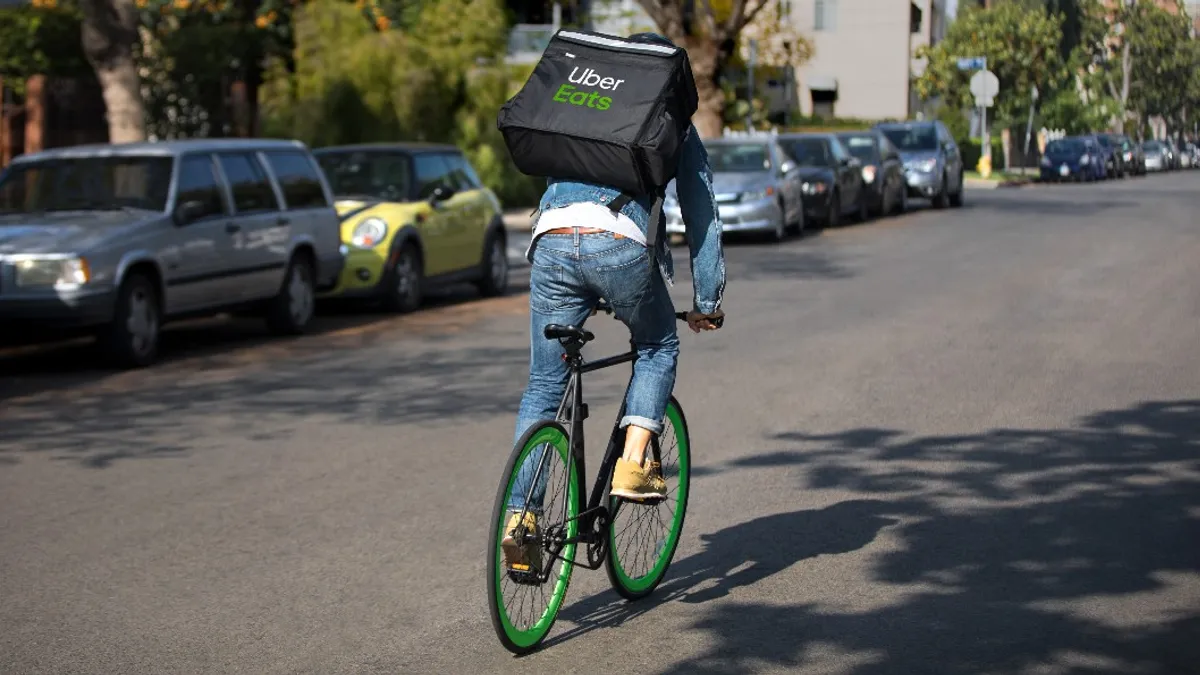Dive Brief:
- Uber has sold its food delivery business in India to Zomato for about 10% of voting capital in Zomato and about $35 million reimbursement by Zomato of goods and services tax, according to an SEC filing.
- "At least some of the investment that we would have otherwise made in India will not be deployed to other countries we serve where we believe we have a clear path to #1 or #2," Uber CFO Nelson Chai said in the filing, referring to the company's desired market standing.
- During the nine months ending Sept. 30, 2019, Uber Eats India posted a total of 8 million monthly active platform consumers, $306 million gross bookings and revenue of $28 million, according to supplemental financial information.
Dive Insight:
The transaction marks another region where Uber Eats has ceased operations (it left Southeast Asia in 2018 and left South Korea in September), but its voting rights in Zomato means it will still at least have some presence in India. The sales price is interesting too, especially since Uber Eats originally asked for $500 million when it first looked into a sale in early 2019. The fact that it sold for much less than that reveals how badly Uber Eats wanted to sell the unit. Considering its loss from operations for the nine months ending Sept. 30, 2019 was $244 million, the sale could help Uber Eats in the long run, especially if it puts money in regions where it can be dominant.
Uber Eats' growth and mild consolidation reveals the risks delivery providers take on when they venture into new regions, ones that have strong, well-established players. Uber Eats previously came close to selling its business to Swiggy, India's other dominate food delivery company, earlier this year, but talks fell through.
Uber said in its Q3 2019 SEC filing that one of the risks of its business is that competitors that have better knowledge of local markets and cited India as an example. Competitors Swiggy and Zomato have established relationships with local restaurants, giving them an advantage.
"As a result, such competitors may be able to respond more quickly and effectively than us in such markets to new or changing opportunities, technologies, consumer preferences, regulations, or standards, which may render our products or offerings less attractive," Uber said in the filing.
Uber Eats never seemed to come close to reaching Zomato and Swiggy's 1 million daily processed orders, either, and reached a high of 600,000, according to TechCrunch. Uber CEO Dara Khosrowshahi said in August that it is aiming to be the first or second top provider in each of the countries Uber Eats is in over the next 18 months or it plans to leave.
Even though Swiggy and Zomato are the dominant players in India, it is still a tough market. Swiggy reported a nearly 500% increase in losses during fiscal year ending March 31, 2019 while its revenue increased 177%. Swiggy has increased its spending on delivery, consumer incentives, salaries and marketing. Zomato has also been increasing its spending — and growing losses — and both are burning through about $40 million to $50 million on discounting and promotions, according to India Times.
These economics mirror those of providers in the U.S., which have largely grown revenue at the sacrifice of ballooning losses for much of the same reasons as Swiggy and Zomato. Delivery companies in the U.S., for example, have largely offered free delivery to gain consumer attention over new restaurant partnerships. Much like with Swiggy, the sacrifice of losses is paying off in the form of growing active diners. But with investors starting to pushback on these huge losses, more consolidation could be expected globally as providers sell off units in regions where they haven't made much ground.














